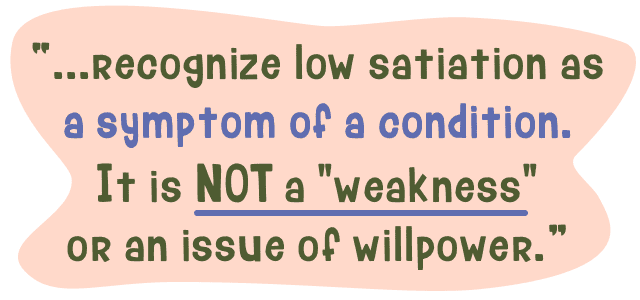Managing a Major Symptom of Obesity: Low Satiation
If you have obesity, it was probably diagnosed by measuring your body mass index (BMI). Having a high amount of body fat, which is measured by BMI, is the main sign of obesity. But did you know that there are other signs and symptoms of obesity? It can help identify the symptoms of obesity that you struggle with. That way, you can make sure those symptoms are being managed properly.
Many symptoms of obesity are mistaken for a personality flaw. This is because obesity is widely misunderstood. And many symptoms of obesity are related to food and eating.
Many people I have treated assumed that eating is a simple choice and that eating less is an issue of will power. They are surprised when I explain that modern obesity science tells us otherwise. Eating is affected by complex biology, and it is a complicated behavior.
Understanding low satiation: Why you don't feel full
Let's take a look at one of the most common symptoms of obesity: low satiation. Satiation is how long you feel full, happy, and satisfied after a meal. If you have low satiation, you will be looking for your next meal soon after eating. People with obesity can eat the same exact food as someone with a normal weight, but not feel as full.
As food digests, fullness hormones that tell the brain, "slow down, stop eating," are released. And, the hormones that make us hungry go down just after we eat. But with obesity, that does not happen as usual.
After a meal, the "hungry" hormone ghrelin stays high in people with obesity. And people report that they still feel somewhat hungry after a meal. Plus, the hormone called peptide YY that triggers fullness is lower in people with obesity after a meal.1
This or That
Did you know low satiation is a symptom of obesity?
Diet strategies to improve fullness
To manage this low satiation with obesity, some dietary strategies can help. Small, more frequent meals can help manage hunger. Eggs may also help increase fullness and reduce later food consumption. Also, a high fiber diet may help. Fermentation of fiber in the gut triggers the release of fullness hormones after a meal.2-4
Weight loss medication and surgery
New weight loss medications that are now available increase fullness between meals. Bariatric surgery also increases fullness. Satiety and hunger hormones change after bariatric surgery. Both medications and surgery help with the low satiation experienced by people with obesity.5,6
It's a symptom, not a weakness
Now you can recognize low satiation as a symptom of a condition. It is not a "weakness" or an issue of willpower. With this knowledge, I hope you can be proactive about addressing it. Try incorporating some fiber, eggs, and smaller, more frequent meals into your diet. Be mindful of how you feel and if those diet changes help. If not, you can also talk with your doctor about medications and surgical options.

Join the conversation